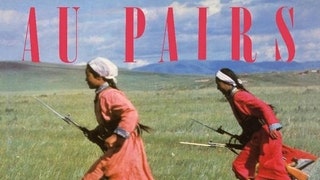In the late 1970s, Rock Against Racism – a disparate network of anti-fascist, anti-racist bands formed in opposition to growing support for the National Front, a far-right, fascist political movement, and the rise of violence against people of color across the country—was at its peak. Thatcher and Reagan were to take their politics to higher office. The situation was unsustainable. In 1978, in Birmingham, Au Pairs were formed by their local RAR chapter. Woods had just dropped out of Birmingham University and, like many other young people in an economically devastated, post-industrial Britain, he was living with fatigue. Through RAR she met Paul, who introduced her to his childhood friend, Pete. They began playing together, inspired by the sharp, discordant sound of bands such as Gang of Four, the Slits and the Pop Group. At first, it was a band called End of Chat, which was more left-field jazz and funk than rock'n'roll. After spending time playing together, with Woods writing the lyrics and the band co-writing everything else, they decided to become a symmetrical four-piece. Two women, two men. Munro joined and at some point End of Chat became Au Pairs. And the Au Pairs became a post-punk band that sounded like no one else, with Woods' perfect alto, a certain sonic symmetry and lyrics that were abstract but utterly powerful.
They became very big on the indie club circuit, very quickly. Their first shows took place just four weeks after Munro joined. They went from being “merely nervous and oppressive”, as one journalist wrote, to having “a coherence, an effortless flow of power and a sense of determination and purpose”. They toured with Gang of Four and the Buzzcocks, playing high-profile gigs that landed them a deal with indie label Human.
Along the way, Woods became a tangible stage presence. She wore high heels, a full face of makeup and sang with shocking honesty about sex. It wasn't exactly well received. “I don't know how they call themselves feminists when they dress like tarts,” one presenter told his reporter Rock it. “You're a girl and you sing for boys and girls and that's fine because it fits the music,” Woods said. Melody Maker, paraphrasing a particularly misogynistic critique of the band. “You couldn't sing about Marxist ideology because you're not smart enough.” In the eyes of the band's critics, what Woods was doing could hardly be called “feminist.” Isn't it bad for women, one might mistakenly think, standing there like a piece of meat? Why couldn't Au Pairs be more like the gang of four – cut out all the satanic stuff and just focus on theoretical Marxism?
